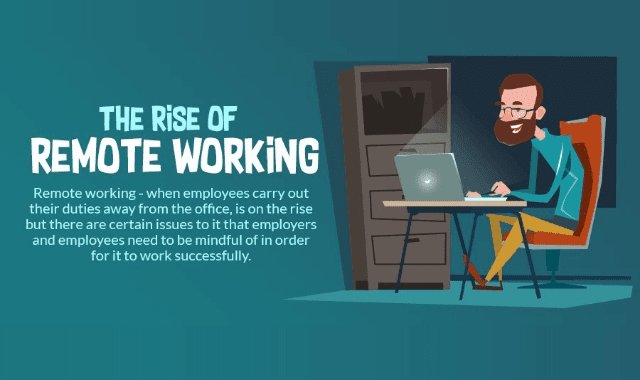The Rise Of Remote Work: A Global Shift In The Workforce
The Rise of Remote Work: A Global Shift in the Workforce
Related Articles: The Rise of Remote Work: A Global Shift in the Workforce
Introduction
In this auspicious occasion, we are delighted to delve into the intriguing topic related to The Rise of Remote Work: A Global Shift in the Workforce. Let’s weave interesting information and offer fresh perspectives to the readers.
Table of Content
The Rise of Remote Work: A Global Shift in the Workforce

The digital revolution has irrevocably altered the way we work. No longer confined to traditional office spaces, a burgeoning global workforce embraces the flexibility and opportunity offered by remote employment. This shift towards remote work has profound implications for individuals, businesses, and the world economy.
The Evolution of Remote Work
The concept of working remotely is not entirely new. Early forms of remote work, such as telecommuting, emerged in the late 20th century, driven by technological advancements like the internet and mobile devices. However, the rise of the internet and cloud computing in the early 21st century truly catalyzed its widespread adoption. This technological infrastructure enables seamless communication, collaboration, and data sharing, regardless of geographical location.
The Appeal of Remote Work
The appeal of remote work is multifaceted, offering a range of advantages for both employees and employers:
For Employees:
- Flexibility and Work-Life Balance: Remote work offers greater control over work schedules, allowing employees to manage personal responsibilities more effectively. This flexibility can lead to improved work-life balance, reduced stress, and increased overall well-being.
- Cost Savings: Working remotely can significantly reduce commuting costs, childcare expenses, and other expenses associated with traditional office environments.
- Wider Career Opportunities: Remote work expands career possibilities, opening doors to roles and companies that may not be geographically accessible.
- Increased Productivity: Studies have shown that remote workers can be more productive due to reduced distractions and the ability to work in their preferred environment.
- Improved Health and Well-being: Remote work can lead to improved physical and mental health, as it allows employees to avoid the stress and health risks associated with commuting and office environments.
For Employers:
- Access to a Global Talent Pool: Remote work allows companies to recruit and hire talent from anywhere in the world, expanding their reach and access to a diverse pool of skilled professionals.
- Cost Savings: Companies can save on office space, utilities, and other overhead costs associated with traditional office environments.
- Increased Productivity: Studies have shown that remote teams can be more productive, thanks to increased focus and reduced distractions.
- Improved Employee Retention: Offering remote work options can improve employee satisfaction and retention, as it provides greater flexibility and autonomy.
- Reduced Environmental Impact: Remote work can reduce carbon emissions by decreasing commuting and office space requirements.
The Global Landscape of Remote Work
The adoption of remote work has been particularly rapid in developed countries with strong internet infrastructure and a culture of technological innovation. However, the trend is spreading rapidly across the globe, driven by factors like:
- The Growth of the Gig Economy: The rise of online platforms connecting freelancers and employers has created a thriving market for remote work, particularly in developing countries.
- Technological Advancements: Improvements in communication technology, cloud computing, and cybersecurity have made it easier and safer for companies to manage remote workforces.
- Changing Workforce Demographics: Millennials and Gen Z, who are accustomed to digital technologies and value flexibility, are driving the demand for remote work opportunities.
- Government Initiatives: Some governments are actively promoting remote work to boost economic growth, reduce unemployment, and improve work-life balance.
Challenges and Considerations
While remote work offers numerous benefits, it is not without its challenges:
- Maintaining Communication and Collaboration: Remote teams need to develop effective communication and collaboration strategies to ensure seamless project execution.
- Managing Work-Life Boundaries: Remote workers need to establish clear boundaries between work and personal life to prevent burnout and maintain a healthy balance.
- Cybersecurity Risks: Remote work requires robust cybersecurity measures to protect sensitive data and prevent cyberattacks.
- Loneliness and Isolation: Working remotely can lead to feelings of isolation and loneliness, particularly for individuals who thrive in social environments.
- Lack of Physical Interaction: Remote work can limit opportunities for face-to-face interactions, which can hinder team building and informal communication.
Addressing Challenges and Ensuring Success
To mitigate the challenges associated with remote work, companies and individuals need to adopt strategies that:
- Foster Strong Communication and Collaboration: Utilize communication tools like video conferencing, instant messaging, and project management software to maintain seamless information flow.
- Promote Team Building and Socialization: Organize virtual team events, social gatherings, and regular check-ins to foster a sense of community and connection.
- Establish Clear Work-Life Boundaries: Define clear work hours, set boundaries between work and personal time, and encourage regular breaks to prevent burnout.
- Implement Robust Cybersecurity Measures: Use strong passwords, multi-factor authentication, and up-to-date security software to protect data and prevent cyberattacks.
- Provide Support and Resources: Offer resources and support to remote workers, including mental health services, ergonomic guidance, and training programs.
The Future of Remote Work
The future of remote work is bright, with continued technological advancements and a growing acceptance of flexible work arrangements. The COVID-19 pandemic accelerated the adoption of remote work, highlighting its viability and benefits. As the world continues to evolve, remote work is poised to become an increasingly integral part of the global workforce.
FAQs: Online Jobs Global Remote
Q1: What are some popular online job platforms for remote work?
A1: Popular online job platforms for remote work include:
- Upwork: A freelance platform connecting businesses with freelancers across various industries.
- Fiverr: A platform for finding freelance services, including writing, design, marketing, and more.
- Remote.co: A job board dedicated to remote work opportunities.
- We Work Remotely: A curated job board featuring remote positions across various industries.
- FlexJobs: A job board specializing in remote, flexible, and part-time work opportunities.
Q2: What are the most in-demand skills for remote work?
A2: In-demand skills for remote work include:
- Communication and Collaboration: Strong communication skills are essential for effective collaboration in remote environments.
- Project Management: The ability to manage projects remotely, prioritize tasks, and meet deadlines is crucial.
- Technology Proficiency: Familiarity with various software and online tools is essential for remote work.
- Time Management: Effective time management skills are critical for maintaining productivity and meeting deadlines.
- Problem-Solving and Adaptability: The ability to solve problems independently and adapt to changing circumstances is essential for remote work.
Q3: How can I find remote work opportunities?
A3: To find remote work opportunities:
- Utilize Online Job Boards: Search specialized remote job boards like Remote.co, We Work Remotely, and FlexJobs.
- Network with Professionals: Connect with professionals in your field and explore opportunities through online communities and professional organizations.
- Update Your Resume and Portfolio: Highlight your relevant skills and experience in a way that showcases your suitability for remote work.
- Use Social Media: Utilize LinkedIn and other professional social media platforms to connect with recruiters and employers seeking remote talent.
- Consider Freelancing Platforms: Explore platforms like Upwork and Fiverr to find freelance projects and build your portfolio.
Q4: What are the legal considerations for remote work?
A4: Legal considerations for remote work include:
- Employment Contracts: Ensure your employment contract clearly outlines your responsibilities, compensation, and legal rights as a remote worker.
- Tax Compliance: Understand your tax obligations as a remote worker, including reporting income and paying taxes in the appropriate jurisdiction.
- Data Privacy: Ensure your employer has implemented adequate data security measures to protect your personal information.
- Work-Life Balance: Negotiate clear work hours and boundaries to prevent burnout and maintain a healthy work-life balance.
Tips for Success in Online Jobs Global Remote
- Develop Strong Communication Skills: Master clear and concise communication, utilize video conferencing, and engage in active listening.
- Establish a Dedicated Workspace: Create a dedicated workspace that minimizes distractions and promotes focus.
- Set Clear Boundaries: Define work hours, establish a routine, and communicate your availability to colleagues and clients.
- Prioritize Time Management: Utilize productivity tools, prioritize tasks, and break down large projects into manageable steps.
- Cultivate Self-Discipline: Develop self-discipline and motivation to maintain focus and productivity in a remote work environment.
- Engage in Professional Development: Continuously update your skills and knowledge to stay competitive in the evolving job market.
- Build a Strong Network: Connect with other remote workers, attend virtual events, and participate in online communities to build relationships and expand your professional network.
Conclusion: Embracing the Future of Work
Online jobs global remote represent a significant shift in the global workforce, offering numerous benefits for individuals and businesses alike. As technology continues to evolve and the demand for flexibility grows, remote work will become an increasingly integral part of the future of work. By embracing the opportunities and addressing the challenges associated with remote work, individuals and companies can unlock a world of possibilities and contribute to a more diverse, productive, and globally connected workforce.






![[Article] The Rise of Remote Work: Transforming the Modern Working World - Excel Academy](https://www.excelacademy.my/wp/wp-content/uploads/2023/06/HRD-Corp-Claimable-The-Rise-of-Remote-Work-Transforming-the-Modern-Working-World.webp)
Closure
Thus, we hope this article has provided valuable insights into The Rise of Remote Work: A Global Shift in the Workforce. We hope you find this article informative and beneficial. See you in our next article!
You may also like
Recent Posts
- Navigating The Digital Landscape: Online Job Opportunities For 17-Year-Olds
- Navigating The Amazon Ecosystem: Online Opportunities For Students
- Navigating The Digital Landscape: Online Jobs In Illinois
- Navigating The Realm Of Remote Work In Malta: A Comprehensive Guide
- The Rise Of Remote Work: A Comprehensive Look At Online Jobs In America
- Unlocking Opportunities: Online Tutoring As A Career Path For Women
- The Rise Of Remote Work: A Comprehensive Guide To Online Jobs From Home In The USA
- The Digital Frontier: Navigating Entry-Level Online Jobs Without Prior Experience

Leave a Reply